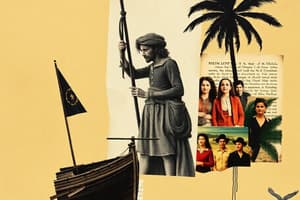Podcast
Questions and Answers
What characteristic defines Robinson Crusoe's identity at the beginning of the story?
What characteristic defines Robinson Crusoe's identity at the beginning of the story?
- Restlessness to find individuality (correct)
- Adherence to family values
- Desire for adventure
- Ambition for wealth
In what narrative style is Robinson Crusoe written?
In what narrative style is Robinson Crusoe written?
- Third person omniscient
- Third person limited
- First person (correct)
- Second person
Which theme in Robinson Crusoe highlights the tension between personal actions and divine influence?
Which theme in Robinson Crusoe highlights the tension between personal actions and divine influence?
- Pragmatism and individualism (correct)
- Community and society
- The quest for wealth
- The power of colonization
How does the setting of the desert island influence Robinson Crusoe's character development?
How does the setting of the desert island influence Robinson Crusoe's character development?
What contrasting elements does Crusoe grapple with throughout the novel?
What contrasting elements does Crusoe grapple with throughout the novel?
Flashcards
Crusoe's Restlessness
Crusoe's Restlessness
Robinson Crusoe's character is shaped by his desire for independence and his search for personal identity, leading him to disobey his father and embark on a journey that results in his isolation.
First-Person Narration
First-Person Narration
The novel is written in the first person, providing a detailed account of Robinson Crusoe's daily life on the deserted island.
Island as Symbol
Island as Symbol
The deserted island becomes a symbol of England's colonial ambitions, with Robinson representing the colonizer and Friday, the first native character, symbolizing the colonized.
Pragmatism & Individualism
Pragmatism & Individualism
Signup and view all the flashcards
Spiritual Autobiography
Spiritual Autobiography
Signup and view all the flashcards
Study Notes
Robinson Crusoe
- Setting: The story primarily takes place on a desert island, serving as an ideal location for Robinson to demonstrate his qualities and prove his worthiness of God's salvation. The island acts as a prototype of the English colonizer and a microcosm of the world.
- Character: Robinson is a middle-class individual, striving for self-identity and independence. His journey is marked by initial disobedience, leading to isolation after a shipwreck. The central theme is the relationship between an individual and society.
- Style: The narrative is first-person, presenting a realistic depiction of daily life. Crusoe meticulously documents and inventories his experiences, highlighting the focus on specifics and concrete details. Emphasis is on clarity and meticulous recording over subjective elements like color and flavor.
- Themes:
- Pragmatism and Individualism: Robinson embodies the pragmatic ideals of 18th-century England, showing that individuals are responsible for their own lives, even as God is the ultimate cause of everything.
- Spiritual Autobiography: The novel uses religious references (God, sin, Providence, salvation) to explore the conflict between financial motivations and spiritual wellbeing. Character's approach is rational and objective, relying on the Bible as a guide.
Studying That Suits You
Use AI to generate personalized quizzes and flashcards to suit your learning preferences.




